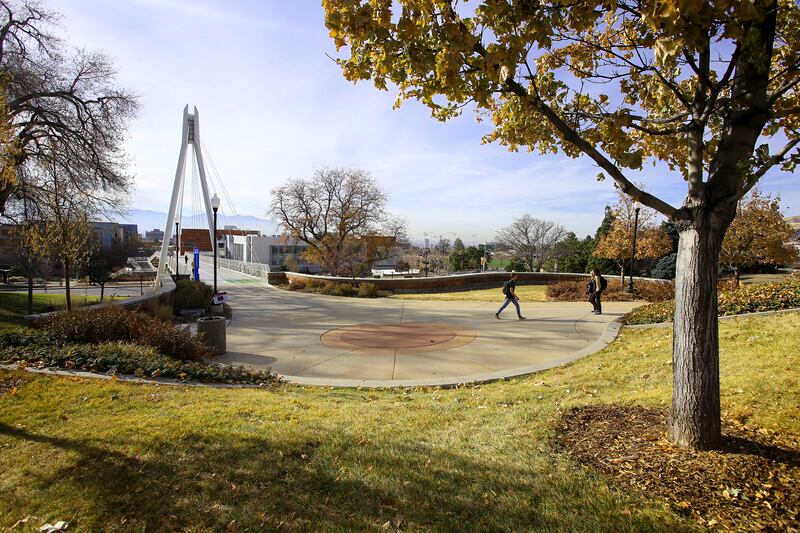SALT LAKE CITY — The University of Utah’s chief safety officer has enrolled the university in an accreditation process with the Commission on Accreditation for Law Enforcement Agencies.
The Salt Lake City Police Department recently achieved that accreditation and “we will do the same,” the U.’s chief safety officer Marlon Lynch told the Utah Legislature’s Education Interim Committee on Monday during a briefing on campus safety. West Valley City is also accredited by this agency.
“It’s much along the same lines as an academic accreditation process, but it’s for public safety. We will take the next two to three years to get to the point where we’re ready for that assessment to be conducted and we will have those external assessors come in and review our police department,” Lynch said.
Seeking the international accreditation is just one step the university is taking to enhance safety and to re-establish trust after the on-campus murder of student-athlete Lauren McCluskey in October 2018 and lingering questions about the public safety department’s handling of her repeated complaints prior to her slaying that she was being stalked, harassed and extorted by an ex-boyfriend.
McCluskey, 21, was shot and killed near her campus dorm in October 2018 by 37-year-old Melvin Rowland, a convicted sex offender who was on parole. The two had dated, but McCluskey ended the relationship after she found out Rowland had lied about his name and age.
Her parents recently filed a $56 million lawsuit in state court against the university alleging campus police and housing officials ignored their daughter’s multiple reports to authorities prior to her death. Earlier, the McCluskeys had filed a federal lawsuit.
Lynch said the university is also working to also establish an independent review committee for incidents such as civil rights violations, abuse of authority and excessive use of force.
Lynch said the university’s preference would be that a law professor lead the committee, which would meet monthly “but could meet on an as-needed basis depending on the need of review of cases,” he said.
“That committee would be able to provide feedback and comment on policies and procedures, as well as on the performance of duties of the officers that were involved in that particular case,” he said.
Lynch’s remarks, which were part of a statewide report to lawmakers on public safety on public colleges and universities, come while the university awaits completion of an outside, independent review of former U. officer Miguel Deras’ alleged handling of explicit cell phone photographs McCluskey shared with police to support her complaints.
Lynch said work is underway to create a public safety advisory committee comprised of students, faculty and staff.
“We will meet twice a month. All new initiatives associated with public safety would be reviewed,” he said.
Lynch said the university also plans to leverage its academic research to develop best practices specific to violence prevention on college campuses. Currently, there is a lot of research data with respect to violence prevention in communities and states but there is relatively little on violence prevention at institutions of higher education, he said.
“We know that our population is different, specifically in the residence halls, in Greek life, and with athletics, but we can’t speak to it confidently enough to say we want to go forward with it. So hopefully as the Center for Violence Prevention evolves and we start to centralize a lot of this research and data, hopefully we can get that information and make it more useful,” Lynch said.
In January, Chris Linder, an assistant professor in the U.’s College of Education, was named a special assistant to President Ruth Watkins to support violence prevention and education efforts on campus.
As part of her work, Linder launched an Interpersonal Violence Prevention & Education Collective comprised of students, staff and faculty to work on primary prevention strategies “using a power-conscious, equitable lens,” a press release said at the time.
Lynch also discussed the role of victim advocates, noting a victim advocate serves within the department and “they respond at any time of the day or at night, no matter what day of the week it is, and they can respond alongside a police officer or independent of a police officer.”
Victims can elect to continue to work with the department’s victim advocate or, when informed of other internal or off-campus resources, seek services from them.
For example, victim survivor advocate services are offered by the U.’s Office of Student Affairs. The office helps students with on-campus needs such as reassignment of housing, alternative class schedules and meetings with professors.
“I think it’s actually extremely important not to rely solely on public safety for services that have traditionally been provided by those with social work experience or mental health experience because the officers, although they receive training, it is generally at the entry level,” Lynch said.
Committee co-chairman Rep. Lowry Snow, R-Santa Clara, said it is critical that victims have advocates and that colleges ensure these services are funded as part of their campus safety plans.
“It’s nice for them to have someone in their corner who will be their advocate and make certain that they get heard,” he said.
Snow complimented Utah campuses’ progress in improving campus safety practices but said there is more to do.
“I think some really good things have been occurring, important things on our campuses since the tragic death of Lauren McCluskey, which is unfortunate. But we have to do a better job and I believe that we are doing a better job and I appreciate you being here and reporting,” Snow said.


